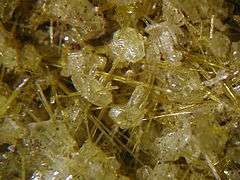Hoelite
| Hoelite | |
|---|---|
|
Yellow acicular crystals of Hoelite (picture size: 10 mm) | |
| General | |
| Category | Organic minerals |
| Formula (repeating unit) | C14H8O2 |
| Strunz classification | 10.CA.15 |
| Dana classification | 50.4.2.1 |
| Crystal system | Monoclinic |
| Crystal class |
Prismatic (2/m) H-M symbol: (2/m) |
| Space group | P21/a |
| Unit cell |
a = 15.81 Å, b = 3.967 Å c = 7.876 Å; β = 102.67°; Z = 2 |
| Identification | |
| Color | Yellow, yellowish green |
| Crystal habit | Acicular clusters; pseudo-orthorhombic |
| Cleavage | Good |
| Streak | Light yellow |
| Diaphaneity | Semitransparent |
| Specific gravity | 1.42 |
| Optical properties | Biaxial (+) |
| Refractive index | nα≈1.75, nβ≈1.75, nγ≈2.0 |
| References | [1][2] |
Hoelite is a mineral, discovered in 1922 at Mt. Pyramide, Spitsbergen, Norway and named after Norwegian geologist Adolf Hoel (1879–1964). Its chemical formula is C14H8O2 (9,10-anthraquinone).[1][3]
It is a very rare organic mineral which occurs in coal fire environments in association with sal ammoniac and native sulfur.[1]
References
| Wikimedia Commons has media related to Hoelite. |
This article is issued from Wikipedia - version of the 11/20/2016. The text is available under the Creative Commons Attribution/Share Alike but additional terms may apply for the media files.
